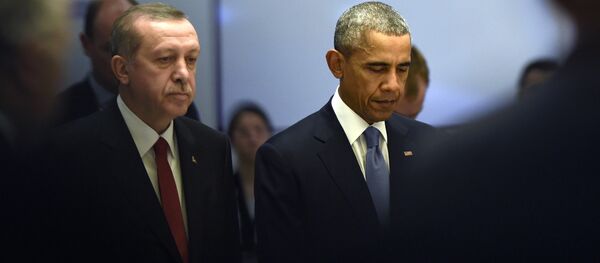In his article for Politico Magazine Andrew J. Bacevich, Professor of International Relations and History at Boston University, draws historic parallels between the World War I bloody stalemate on the Western Front and an analogous stalemate Washington has found itself stuck in in the Middle East and Islamic world in general.
"To reflect on this longest of American wars — why it goes on and on, and at such a cost of blood and treasure — is to confront two questions… In short, why can't we win? And since we haven't won, why can't we get out?" Bacevich asks.
Bacevich recalls that the idea of "shaping" the global order originated in the 1992 military doctrine propelled by then-Undersecretary of Defense for Policy Paul Wolfowitz.
The collapse of the USSR prompted Washington to regard itself as the sole hegemon, capable of shaping the "new world order."
Alas, "Wolfowitz and other leaders of the foreign policy establishment vastly exaggerated the US military's capacity for shaping the global order. The Middle East has proved particularly resistant to US 'shaping.' Instead, the presence of US forces has engendered considerable resistance," Christopher Preble, the vice president for defense and foreign policy studies at the Cato Institute, remarks, commenting on Bacevich's article.
However, for a long period of time the US political establishment viewed the Middle Eastern region as its own playground.
"That region's predominantly Muslim population thereby became the subjects of experiments ranging from the nominally benign — peacekeeping, peacemaking and humanitarian intervention — to the nakedly coercive," Bacevich narrates.
Needless to say their dreams never came true.
What lies at the root of this failure? There is one possible explanation, Bacevich believes: "In stark contrast to the Cold War, American purposes and US military policy in the Islamic world have never aligned." Instead of mitigating risks the US military activism has been creating new threats.
To add insult to injury, there is no consistent understanding in Washington of "what the United States is fighting for and whom it is fighting against" in the Middle East, the US scholar underscores.
As a result of this inconsistent foreign policy strategy Washington has found itself in a vicious circle of a perpetual war.
"Time and again, from the 1980s to the present, US military power, unleashed rather than held in abeyance (as it was for most of the Cold War), has met outright failure, produced results other than those intended, or proved to be largely irrelevant," Bacevich stresses.
"The Middle East was never actually that important to the United States, a point that others have made, and well, and the region has become even less important with the passage of time," Preble stresses in his article for the National Interest.
The scholars underscore that it the time has come to stop the "hopeless" war in the Middle East.
"If Washington persists with its grandiose plans for reshaping the region, and the world, we must assume that they have ignored Andrew Bacevich's cogent analysis. But they can't say they weren't warned," Preble emphasizes.




